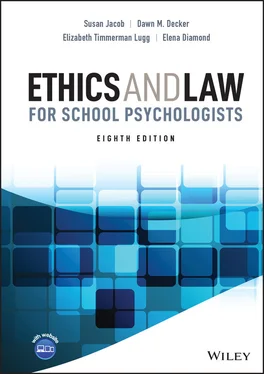Susan Jacob - Ethics and Law for School Psychologists
Здесь есть возможность читать онлайн «Susan Jacob - Ethics and Law for School Psychologists» — ознакомительный отрывок электронной книги совершенно бесплатно, а после прочтения отрывка купить полную версию. В некоторых случаях можно слушать аудио, скачать через торрент в формате fb2 и присутствует краткое содержание. Жанр: unrecognised, на английском языке. Описание произведения, (предисловие) а так же отзывы посетителей доступны на портале библиотеки ЛибКат.
- Название:Ethics and Law for School Psychologists
- Автор:
- Жанр:
- Год:неизвестен
- ISBN:нет данных
- Рейтинг книги:3 / 5. Голосов: 1
-
Избранное:Добавить в избранное
- Отзывы:
-
Ваша оценка:
- 60
- 1
- 2
- 3
- 4
- 5
Ethics and Law for School Psychologists: краткое содержание, описание и аннотация
Предлагаем к чтению аннотацию, описание, краткое содержание или предисловие (зависит от того, что написал сам автор книги «Ethics and Law for School Psychologists»). Если вы не нашли необходимую информацию о книге — напишите в комментариях, мы постараемся отыскать её.
Ethics and Law for School Psychologists
Ethics and Law for School Psychologists
Ethics and Law for School Psychologists — читать онлайн ознакомительный отрывок
Ниже представлен текст книги, разбитый по страницам. Система сохранения места последней прочитанной страницы, позволяет с удобством читать онлайн бесплатно книгу «Ethics and Law for School Psychologists», без необходимости каждый раз заново искать на чём Вы остановились. Поставьте закладку, и сможете в любой момент перейти на страницу, на которой закончили чтение.
Интервал:
Закладка:
A number of student lawsuits concerning school disciplinary actions (e.g., illegal search and seizure, unreasonable corporal punishment) have been filed under Section 1983. School officials may have qualified immunity from Section 1983 lawsuits. The standard for qualified immunity applicable to government (school) officials is as follows: “Government officials performing discretionary functions are shielded from liability for civil damages unless their conduct violated clearly established statutory or constitutional rights of which a reasonable person would have known” ( Harlow v. Fitzgerald , 1982, p. 817). Hummel et al. (1985, p. 78) suggested that school personnel generally will not be held liable in Section 1983 lawsuits as long as they are “acting clearly within the scope of their authority for the betterment of those they serve” (e.g., Landstrom v. Illinois Department of Children and Family Services , 1990).
Professional Malpractice
Professional malpractice suits are civil lawsuits (torts) filed against individual practitioners under state statutory and common law. Professional malpractice occurs when, in the context of a psychologist–client relationship, a client suffers harm and it is determined that the harm was caused by departure from acceptable professional standards of care (Bennett et al., 2006). The likelihood of a psychologist being sued for malpractice is small. Over a 20 year period, under 2 percent of psychologists had a malpractice suit filed against them (Novotney, 2016). As noted, whether an individual school-based practitioner is immune from liability under state law during performance of their job duties varies from state to state. Psychologists in private practice, however, can be held liable for malpractice in all states.
When a professional–client relationship exists and the psychologist is acting in a professional capacity, they are expected to provide “due care,” or a level of care that is “standard” in the profession. To succeed in a malpractice claim, the plaintiff must prove four facts: (1) a professional relationship was formed between the psychologist and plaintiff so that the psychologist owed a legal duty of care to the plaintiff; (2) the duty of care was breached; that is, a standard of care exists and the practitioner breached that standard; (3) the client suffered harm or injury; and (4) the practitioner’s breach of duty to practice within the standard of care was the proximate cause of the client’s injury; that is, the injury was a reasonably foreseeable consequence of the breach (Bennett et al., 2006).
How does the court determine the standard of care? In most cases, the courts look to the profession itself to identify the customary standard of care used by others in the same field. Expert testimony may be used to establish the customary standard of care. In addition, codes of ethics may be presented as evidence of the parameters of accepted practice. Sometimes the client’s condition is a key factor in determining the expected standard of care (e.g., acceptable and reasonable actions in handling a suicidal adolescent). If the psychologist is not qualified to work with a particular type of problem situation, they are obligated to refer the client to someone with appropriate training (Bennett et al., 2006).
According to Woody (1988), the key words related to defining the appropriate standard of care are ordinary , reasonable , and prudent . Ordinary pertains to what is accepted or customary practice. Reasonable relates to the appropriate and adequate use of professional knowledge and judgment. Prudent means the exercise of caution, not in the sense of being traditional or conservative, but rather maintaining adequate safeguards.
Risk Management
School psychologists should be familiar with the term risk management . Unlike ethical decision-making models that have the primary goal of safeguarding the welfare of the client, a risk management analysis is conducted to minimize exposure of the school or the practitioner to legal liability (Behnke & Jones, 2012). It is understandable that school districts and school psychologists wish to avoid lawsuits and other legal actions against them. Lawsuits and due process hearings are stressful, time consuming, and expensive. However, it is important “to avoid placing the protection of [the school] or the professional from legal action above the welfare of the client” (Welfel, 2012, p. 284). Experts in ethics and law agree that the best way to avoid lawsuits is “to do the right thing” (Knapp et al., 2012; Welfel, 2012). For school districts, this means knowing and respecting the legal rights of students and parents. For individual practitioners, this means knowing and making decisions consistent with our codes of ethics and aspirational ethical principles as well as working to safeguard the legal rights of schoolchildren and other clients (Knapp et al., 2012; Welfel, 2012). Readers interested in risk management strategies are referred to Bennett et al. (2006), Knapp et al. (2012), and Sales et al. (2005).
Professional Liability Insurance
To protect themselves and perhaps ease their fear of litigation, some school psychologists purchase professional liability insurance. Prior to purchasing a policy, school psychologists should investigate what type of coverage, if any, is provided by their employers and whether any professional liability insurance is provided by their membership in a professional union, such as the National Education Association or American Federation of Teachers. Both the NASP ( http://www.nasponline.org) and the American Psychological Association ( http://www.apa.org) have information about professional liability insurance on their Web sites. Internship students are well advised to consider purchasing liability insurance (often available at a student rate) because they may not be covered by their school district’s policies.
In choosing an insurance policy, several points should be kept in mind. First, be sure to study the policy carefully to know what is and is not covered. Some professional liability policies cover school psychologists only when their services are performed during school-based practice. In other words, they do not cover private practice. Such policies are generally much less expensive than those that cover private work. Second, policies may be either based on claims made or occurrence based. Under the former, the practitioner is covered only if insured when the alleged malpractice took place and when the claim was filed. Under the latter, called an occurrence-based policy, the practitioner is covered as long as they were insured when the alleged malpractice took place, regardless of when the claim was filed. Third, many policies reserve the right to select legal counsel and to settle the case. This may be discouraging to practitioners who want their day in court. The psychologist may still hire their own attorney to work with the one supplied by the insurance carrier, but that is an additional expense (see Knapp et al., 2012, for additional information).
CONCLUDING COMMENTS
This chapter provided a brief overview of public school law pertinent to school psychology. School psychologists are ethically and professionally obligated to be familiar with law and to keep abreast of changes in law affecting practices. We concur with Reschly and Bersoff (1999) view that understanding of law is important “as means to protect precious rights, as well as a method to resolve disagreements over rights and responsibilities. The better understanding of legal influences is one way to enhance opportunities for implementing the best professional practices.”
Читать дальшеИнтервал:
Закладка:
Похожие книги на «Ethics and Law for School Psychologists»
Представляем Вашему вниманию похожие книги на «Ethics and Law for School Psychologists» списком для выбора. Мы отобрали схожую по названию и смыслу литературу в надежде предоставить читателям больше вариантов отыскать новые, интересные, ещё непрочитанные произведения.
Обсуждение, отзывы о книге «Ethics and Law for School Psychologists» и просто собственные мнения читателей. Оставьте ваши комментарии, напишите, что Вы думаете о произведении, его смысле или главных героях. Укажите что конкретно понравилось, а что нет, и почему Вы так считаете.












